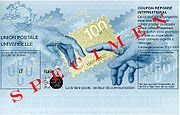 business dealings was evidently some people's first exposure to the concept of ponzi schemes. I find this very hard to believe, but have no other explanation for the sudden intense upswing in scrutiny of ponzi schemes.
business dealings was evidently some people's first exposure to the concept of ponzi schemes. I find this very hard to believe, but have no other explanation for the sudden intense upswing in scrutiny of ponzi schemes.Background: What are "P
 onzi schemes" and why are they called that?
onzi schemes" and why are they called that?Ponzi was an Italian immigrant to the United States who first learned of the concept, at least in a business context, from working at a Canadian bank that employed this plan to entice people to deposit their money there - those depositing money were offered double the going market interest rate, this drawing in so many new depositors (the bank relied primarily on Italian immigrants), that it was able to keep up these interest payments despite bad loans, which in any case, probably wouldn't have been sufficient to make the interest payments and sustain a profitable bank. When the bank failed, the owner fled with a substantial portion of the money to Mexico.
Ponzi ended up slipping into a former customer's office and writing himself a check to facilitate his escape to America, but was caught by police and spent 3 years in prison.

He then got involved in a scheme to smuggle immigrants across the border and ended up spending a couple more years in an American prison when he met and studied the fashionings of a Wall Street scam artist, Charles Morse.
Ponzi's Scheme, Part 1: International Reply Coupons
IRCs are this rather fabulous device that allows people who are in one country and want to allow people in another country to send them things pre-paid to do so by translating a coupon bought in say, Italy, into postage in the United States. Basically like those pre-paid return envelop
 es you get from catalog companies. But the trick was that arbitrage was a valuable option due to the disparity in currency/postage values between the great wars. You paid for the cost of postage in the country of origin and then got to exchange that for the equivalent cost of postage in the country of receipt. In this case, Italy was a low-cost postage country, the United States a relatively high-cost country and as a result, money sent from the U.S. to Italy to buy IRCs which were then returned to the U.S. could then be turned into U.S. postage of a greater value than the amount sent. Pretty impressive, really. Evidently the profit was something like 400%, although it did have the complication of having to sell U.S. postage as a private citizen.
es you get from catalog companies. But the trick was that arbitrage was a valuable option due to the disparity in currency/postage values between the great wars. You paid for the cost of postage in the country of origin and then got to exchange that for the equivalent cost of postage in the country of receipt. In this case, Italy was a low-cost postage country, the United States a relatively high-cost country and as a result, money sent from the U.S. to Italy to buy IRCs which were then returned to the U.S. could then be turned into U.S. postage of a greater value than the amount sent. Pretty impressive, really. Evidently the profit was something like 400%, although it did have the complication of having to sell U.S. postage as a private citizen.This is still a possibility, if you're on top of the fluctuations in cost of living between different countries. It was a solid plan, theoretically, but difficult to implement (potentially so difficult that the costs would have been prohibitive for a profitable company) and ultimately, Ponzi was lazy and a result he ended up paying off old investors with the investments of new investors.
In a dying interview, he expressed what sounds, uncomfortably like many financiers today: "Even if they
 never got anything for it, it was cheap at that price. Without malice aforethought I had given them the best show that was ever staged in their territory since the landing of the Pilgrims! It was easily worth fifteen million bucks to watch me put the thing over."
never got anything for it, it was cheap at that price. Without malice aforethought I had given them the best show that was ever staged in their territory since the landing of the Pilgrims! It was easily worth fifteen million bucks to watch me put the thing over."Many, many other Ponzi schemes:
If you are interested, there are plenty more examples, all following the same basic premise. Among the more interesting are a Scientology scam by Reed Slatkin, a "minister" of the "religion." Weirdly, at some point this involved a Grateful Dead roadie: "Federal prosecutors announced tax-evasion charges Tuesday against former Grateful Dead road manager Ronald L. Rakow and his girlfriend in connection with a scheme to conceal Rakow’s income, much of which he earned working for convicted Ponzi scheme operator Reed Slatkin."
Other things that for average people are scams and thus categorized as pyramid schemes as some sort and about which a bunch of difficult people who don't mind average people being scammed whine that they're not really pyramid schemes:
Avon cosmetics, Mary Kay etc.: These really don't work nowadays because if you have a legitimate product, you don't want to rely on random "representatives" to sell the bulk of your product. You want to sell it online. In your online store.
So then what could possibly be the benefit of becoming an Avon representative?

Evidently, the solution is that you are meant to bring in other people underneath you, who are selling for you, thereby allowing you to sit around and do nothing. Basically a pyramid scheme for anyone not at the top of a pyramid within the pyramid.
The thing that's really unreasonable about this, and other "work at home" plans that are just out-and-out scams, is that they prey on the most defenseless individuals - those who are least likely to be informed, most likely to be desperate, and least likely to be able to take action against those who scammed them. I mean, at some point, it has to be a legitimate claim that the "company" you dealt with misrepresented your opportunities, understated the risk, and deliberately tried to convince you that this was just an easy at home way to make money.
Video Professor Fellow: You always have to be careful when you are given "free offers." Particularly when the underlying product makes no sense, like a dvd that teaches you how to sell things on ebay. I mean, ebay tells you that. There's not a lot to it. At all. So I was not at all surprised to discover a plethora of horror stories about inappropriate charges following a "trial" with video professor.
There are many other infomercial type scams listed here. There are many more than these, but you get the idea.

Conclusion: Use some common sense, PLEASE
I've posted absurd letters from people claiming to be some variation on the son of a deposed African prince, including response letters I've sent explaining how their letters were preposterous. I think the rule is, if you're going to be scammed, it should be a good scam. Legitimate people should be confused. It should be scammish enough to send the individuals responsible to jail. If it seems too good to be true, figure out if it really is. Don't give in to the impulse to believe that wonderful unbelievable things can happen and magically fix one's life.




